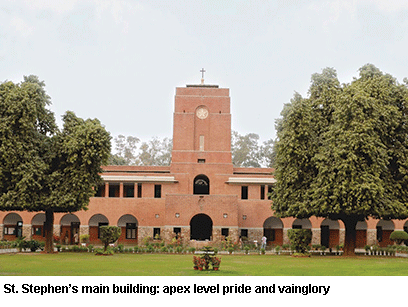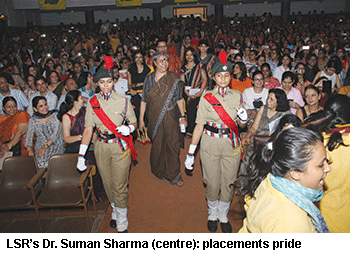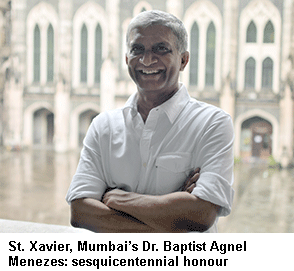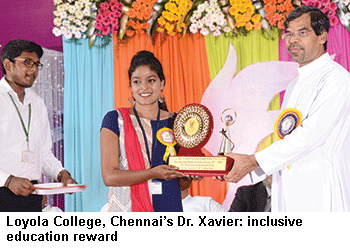Accepting the validity of the argument that the overwhelming majority of the country’s estimated 39 million school-leavers enter arts, science and commerce undergrad colleges annually, C fore field personnel interviewed 946 college faculty and 824 final year students to rate and rank India’s most well-known multi-disciplinary colleges on six parameters of education excellence - Dilip Thakore
 Widely acclaimed for pioneering the annual EducationWorld India School Rankings (estb. 2007), arguably the world’s most comprehensive survey rating India’s Top 1,000 primary-secondary schools in 14 distinctive categories on 14 parameters of excellence and ranking them nationally, in the states and host cities, we introduced our EducationWorld India Higher Education (EWIHE) Rankings in June 2013. The initiative was primarily to draw attention to private professional colleges and universities which tend to get short shrift in the institutional surveys of mainstream media.
Widely acclaimed for pioneering the annual EducationWorld India School Rankings (estb. 2007), arguably the world’s most comprehensive survey rating India’s Top 1,000 primary-secondary schools in 14 distinctive categories on 14 parameters of excellence and ranking them nationally, in the states and host cities, we introduced our EducationWorld India Higher Education (EWIHE) Rankings in June 2013. The initiative was primarily to draw attention to private professional colleges and universities which tend to get short shrift in the institutional surveys of mainstream media.
With government — especially Central government — promoted engineering colleges (IITs, NITs etc), universities and B-schools (IIMs) dominating the league tables of national periodicals such as India Today, Outlook and business magazines, we believed that a useful social purpose would also be served by highlighting the silently rising number of private universities, engineering colleges and B-schools. Many among them have emerged as good quality alternatives to ruinously expensive foreign institutions of higher education for school-leavers unable to qualify for admission into top-ranked government institutions which demand sky-high cut-offs in class XII qualifying exams. Positive public reaction to this initiative has prompted us to publish the EWIHE Rankings annually.
Inevitably, the EWIHE Rankings have evolved — and will continue to evolve — with the passage of time. This year in response to feedback received from our multiplying number of readers and accepting the validity of the argument that the overwhelming majority of the estimated 39 million school-leavers enter multi-disciplinary arts, science and commerce colleges annually, we commissioned the well-known field research agency, the Delhi-based Centre for Research & Forecasting Pvt. Ltd (C fore) to conduct an additional survey to rate and rank the country’s Top 100 multi-disciplinary arts, science and commerce colleges in six metro cities.
Accordingly, C fore constituted a sample respondents database of 1,770 knowledgeable individuals comprising 946 college faculty and 824 final year students. They were interviewed by C fore field personnel to rate the country’s most well-known multi-disciplinary colleges on six parameters of undergrad education — competence of faculty, faculty welfare and development, curriculum and pedagogy, industry placements, infrastructure and leadership and governance quality — on a 100 point scale with the vital parameter of competence of faculty accorded a weightage of 200. The scores awarded by the respondents under each parameter were totalled and formed the basis for ranking the country’s Top 100 arts, science and commerce colleges inter se.
Unsurprisingly, the Top 10 arts, science and commerce colleges list comprises the usual suspects with the Delhi-based St. Stephen’s, Shri Ram College of Commerce and Lady Shri Ram College for Women — which despite their 95 percent plus cut-off requirements experience an annual admission scramble of manic proportions — followed by St. Xavier’s, Mumbai and Miranda House, Delhi (ranked #1 in the HRD ministry’s NIRF colleges league table) who make up the Top 5.
 The remaining five colleges voted to the Top 10 table — Christ University, Bangalore; Sri Venkateswara and Hindu colleges, Delhi; Loyola College, Chennai and St. Joseph’s College (Autonomous), Bangalore — don’t offer any surprises either, except perhaps the last named. It’s worthy of note that five of the country’s most admired multi-disciplinary undergrad colleges are owned and managed by Christian minority orders, whose patriotism and capabilities are being questioned by regressive hindutva organisations with close ties with the ruling BJP/NDA government in New Delhi, and that all of them are privately promoted, albeit ‘aided’ by the Central and/or state governments.
The remaining five colleges voted to the Top 10 table — Christ University, Bangalore; Sri Venkateswara and Hindu colleges, Delhi; Loyola College, Chennai and St. Joseph’s College (Autonomous), Bangalore — don’t offer any surprises either, except perhaps the last named. It’s worthy of note that five of the country’s most admired multi-disciplinary undergrad colleges are owned and managed by Christian minority orders, whose patriotism and capabilities are being questioned by regressive hindutva organisations with close ties with the ruling BJP/NDA government in New Delhi, and that all of them are privately promoted, albeit ‘aided’ by the Central and/or state governments.
Unfortunately and unprecedentedly, despite numerous efforts through several media — landline, email, post, cellphone and SMS — to obtain an appreciative or otherwise reaction from St. Stephen’s, Delhi, ranked #1 in the EWIHE Rankings 2018 in the category of undergrad arts, science and commerce colleges, proved unsuccessful. Evidently, Prof. John Varghese, principal of St. Stephen’s despite being an alum of Loyola College and Madras Christian College with professedly special interest in media and language teaching, is not untouched by the sins of pride and vainglory because notwithstanding numerous entreaties, he adamantly refused to acknowledge the college’s #1 ranking as cause for celebration.
Similarly, but to a far lesser degree, because of the emphasis on “harmony, non-competition and cooperation”, in Lady Shri Ram College (LSR), Delhi neither Dr. Suman Sharma nor the faculty are enthused by league tables published by the media. Nevertheless, Sharma admits that being ranked the country’s #1 women’s arts, science and commerce college and #3 nationally, is “a matter of great satisfaction”.
“I am glad the hard work being done by our faculty to research and implement global best practices in women’s undergrad education is appreciated. We pride ourselves for having created a vibrant teaching-learning environment in which students’ creativity and innovative thinking is stimulated,” she says.
A political science alumna of LSR and Delhi University with a Ph D awarded by JNU, Sharma served on the faculty of the Motilal Nehru College of Delhi University for over three decades and as principal of Dyal Singh Evening College, Delhi prior to being appointed principal of LSR in November last year. Sharma is especially pleased that LSR is rated #1 countrywide on the parameter of curriculum and pedagogy with high scores on the parameters of faculty welfare and development, and placement of graduates.
“I am glad your sample respondents have given us the highest score on this parameter because our teachers are truly innovative and teach far beyond the Delhi University syllabus. This is reflected in our high rating under the parameter of placements. Every year, over 100 top-ranked companies visit our campus for recruitment. This year, the average annual start-up remuneration package offered to LSR graduates was Rs.7.1 lakh with one of our students placed with a Rs.37.8 lakh package,” says Sharma, denying “any animosity, only cooperation” towards the neighbouring Miranda House women’s college, ranked the country’s #1 undergrad college in the HRD ministry’s NIRF 2018 rankings.
Conversely, Dr. Baptist Agnel Menezes, principal of St. Xavier’s College, Mumbai (estb. 1869), is “elated” by the news that this vintage arts, science and commerce undergrad college which has an aggregate enrolment of 3,150 students mentored by 122 faculty, is ranked #4 countrywide, and especially #1 in Maharashtra, the country’s “most industrially advanced state”.
 “This timely honour on the eve of our sesquicentennial jubilee which begins next month is very encouraging. The high ranking given to us by your informed respondents is the outcome of consistent hard work done by our 120-plus faculty and support staff, and our enthusiastic and dedicated students. Apart from providing high quality education, we also pride ourselves on our Jesuit inclusion policies which have enabled us to educate students from socio-economically disadvantaged groups. Our sesquicentennial could well prove to be a momentous year. The Maharashtra government has offered St. Xavier’s an opportunity to upgrade to university status under the Central government’s RUSA programme. Our management is deliberating this offer. If accepted, it will radically alter our structure and future,” says Menezes, an economics alum of St. Xavier’s and Mumbai University who taught economics at the Dr. T.K. Tope Night College of Arts, Science and Commerce for almost two decades (1989-2008) before signing up with St. Xavier’s as associate professor of economics in 2008, and being promoted to the office of principal in 2015.
“This timely honour on the eve of our sesquicentennial jubilee which begins next month is very encouraging. The high ranking given to us by your informed respondents is the outcome of consistent hard work done by our 120-plus faculty and support staff, and our enthusiastic and dedicated students. Apart from providing high quality education, we also pride ourselves on our Jesuit inclusion policies which have enabled us to educate students from socio-economically disadvantaged groups. Our sesquicentennial could well prove to be a momentous year. The Maharashtra government has offered St. Xavier’s an opportunity to upgrade to university status under the Central government’s RUSA programme. Our management is deliberating this offer. If accepted, it will radically alter our structure and future,” says Menezes, an economics alum of St. Xavier’s and Mumbai University who taught economics at the Dr. T.K. Tope Night College of Arts, Science and Commerce for almost two decades (1989-2008) before signing up with St. Xavier’s as associate professor of economics in 2008, and being promoted to the office of principal in 2015.
Down south in Tamil Nadu, Dr. Arockiasamy Xavier, SJ, principal of Chennai’s well-known Loyola College (estb. 1925) which has an aggregate enrolment of 9,841 students mentored by 365 faculty, is “also delighted” that Loyola is ranked among India’s Top 10 (#9) arts, science and commerce undergrad colleges.
 We are especially pleased to learn that Loyola is ranked #2 in South India and #1 in Tamil Nadu and Chennai. This is recognition of our loving service to students of all religious faiths, castes and communities, although we are a Catholic minority institution founded 93 years ago by the Society of Jesus. Nevertheless, our gates are open to the poor and marginalised as well as students of all religious communities to whom we provide high quality undergraduate and postgrad education. The broad-based in-depth education provided by our faculty which includes 165 academics with Ph D degrees is testified by the high ranking awarded to us by India Today which has repeatedly ranked us among the country’s Top 10 arts, science and commerce colleges since 2006. Moreover in 2017, Loyola College was awarded #2 rank in the NIRF India Rankings with a score of 100/100 on the parameter of research and professional practice,” says Xavier.
We are especially pleased to learn that Loyola is ranked #2 in South India and #1 in Tamil Nadu and Chennai. This is recognition of our loving service to students of all religious faiths, castes and communities, although we are a Catholic minority institution founded 93 years ago by the Society of Jesus. Nevertheless, our gates are open to the poor and marginalised as well as students of all religious communities to whom we provide high quality undergraduate and postgrad education. The broad-based in-depth education provided by our faculty which includes 165 academics with Ph D degrees is testified by the high ranking awarded to us by India Today which has repeatedly ranked us among the country’s Top 10 arts, science and commerce colleges since 2006. Moreover in 2017, Loyola College was awarded #2 rank in the NIRF India Rankings with a score of 100/100 on the parameter of research and professional practice,” says Xavier.
In the Top 11-20 table, the notable inclusions are Mount Carmel College, Bangalore (#12 nationally and #2 in Bangalore), Madras Christian College (#14 and #2 in Chennai), St. Xavier’s College, Kolkata (#14 and Kolkata’s #1), St. Francis College for Women, Hyderabad (#17 nationally but # 1 in Hyderabad) followed by Mumbai’s fancied Mithibai and Narsee Monjee colleges (#18 and #19 nationally and #2 and #3 in India’s commercial capital).